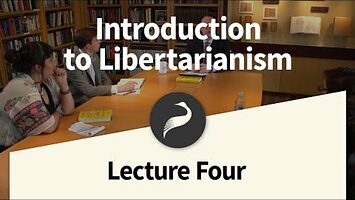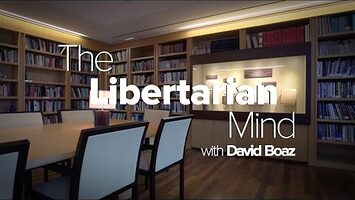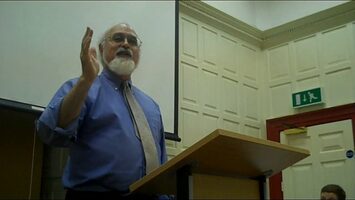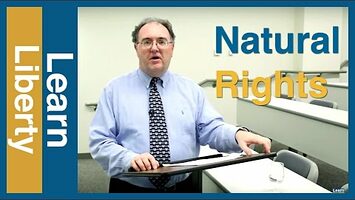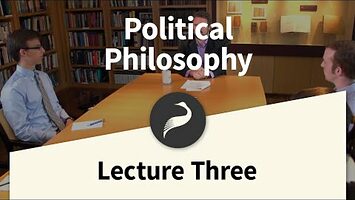Natural Rights
Encyclopedia
Natural rights are rights that individuals possess by nature rather than by law or convention. Rights belonging to all human beings universally also are termed human rights, a phrase often interchangeable with natural rights. Many political and legal theorists claim that individuals have such rights against other individuals and against the state. Libertarians appeal to natural rights to argue that the power of government should be strictly limited, and anarchists contend that the very existence of the state is inimical to individual natural rights. Such theorists have the burden of demonstrating that individuals, in fact, have natural rights and of explaining what precisely they have rights to.
Jurists as well as political philosophers have made important contributions to the understanding of natural rights. In the law, natural rights are treated as a species of constitutional rights, as distinguished from political and civil rights, which are created and circumscribed by legal codes. Political rights are rights related to citizenship and government (e.g., to vote or hold office), and civil rights are other rights belonging to citizens or legal residents (e.g., to marry or to make contracts). Natural rights, in contrast, are regarded as innate, as growing out of human nature, or as required by one’s natural ends (e.g., rights to life, liberty, privacy, etc.).
The legal theorist W. N. Hohfeld showed that a right is a legal relation involving three terms, and that this relation takes different forms. The most common right is a claim of an individual against another individual to a performance (e.g., to be repaid a debt). Such a right entails a correlative duty of the other individual to perform (e.g., to repay the debt). But there are other important kinds of rights. One has a right in the sense of liberty (or privilege) when one has no duty to another person to act in a particular way (e.g., the right to use one’s own property as one sees fit). One has a right in the sense of power (or authority) over others when one is able to create legal relations involving rights and duties (e.g., the right to make promises or contracts). One has a right in the sense of immunity when one is not subject to a specific power (e.g., the right against self-incrimination). In general, an ordinary right (e.g., ownership of a house) is analyzable into bundles of such relations.
Hohfeld’s analysis implies that the distinction drawn from Roman law between rights in personam (against a person) and in rem (to a thing) disguises the fact that both rights involve three terms: A right in personam is a claim against a particular individual, whereas a right in rem (e.g., a right to property) is a claim against other persons generally. This distinction also helps to clarify a basic political controversy over rights. According to many libertarian (or classical liberal) theories, the only claims individuals have against all other individuals are rights not to be harmed or threatened with harm by others. Such rights entail “negative” duties—that is, duties on the part of others to refrain from harming them. Libertarians allow that individuals also may acquire rights to benefits through voluntary interactions (e.g., contracts). According to welfare liberal theories, however, individuals also have claims to their well-being against all others. Such rights entail “positive” duties—that is, duties on the part of others, and hence the state, to provide them with welfare.
The task of a theory of natural rights, then, is to demonstrate that individuals have certain rights (claims, liberties, etc.) on the basis of human nature, rather than of prevailing laws or conventions, and to determine the scope of such rights. The attempt to provide a philosophical justification for rights may be traced to antiquity. Arguably, the idea was already recognized in nascent form by even earlier thinkers such as Aristotle, who reasoned that citizens who are equal by nature have the same natural right (i.e., just claim) to political office. In the late Middle Ages, the concept of natural rights began to emerge in a more recognizably modern form. A controversy arose among canon lawyers, philosophers, and theologians over whether the right to private property was conventional—Franciscans like William of Ockham—or natural—Dominicans like John of Paris. Some (e.g., Henry of Ghent) asserted a natural right of self-ownership. Late medieval natural rights theorists assumed the existence of natural law laid down by God, the divine legislator.
Natural rights were theorized by a series of early modern thinkers, including Hugo Grotius, Thomas Hobbes, Samuel Pufendorf, and, most influentially, John Locke, who argued that natural rights exist in the state of nature:
The State of Nature has a Law of Nature to govern it, which obliges every one: And reason, which is that law, teaches all mankind, who will but consult it, that being all equal and independent, no one ought to harm another in his life, health, liberty, or possessions.
The natural rights of individuals consist primarily in self-ownership and, by extension, in property rights:
Though the Earth, and all inferior creatures be common to all men, yet every man has a property in his own person. This no body has any right to but himself. The labour of his body, and the work of his hands, we may say, are properly his. Whatsoever then he removes out of the state that nature hath provided, and left in it, he hath mixed his labour with, and joined to it something that is his own, and thereby makes it his property.
According to Locke, men leave the state of nature to form governments to preserve their property, which Locke understood to encompass “life, liberty, and estate.” The positive laws of political society “are only so far right as they are founded on the Law of Nature, by which they are to be regulated and interpreted.” A ruler who flouts the law of nature and the natural rights of his subjects may be removed. Locke’s Second Treatise of Government was originally written to justify a revolution against James II, which eventuated in the Glorious Revolution of 1688, by which the King was deposed and replaced.
The revolutionary implications of Locke’s theory also were manifest in the American Declaration of Independence (1776):
We hold these truths self-evident, that all men are created equal, that they are endowed by their Creator with certain unalienable rights, that among these are life, liberty, and the pursuit of happiness—that to secure these rights, governments are instituted among men, deriving their just powers from the consent of the governed, that whenever any form of government becomes destructive of these ends, it is the right of the people to alter or to abolish it, and to institute new government.…
The explicit basis for these rights is “the laws of nature and of nature’s God.”
Those who embrace a natural rights theory are faced with a problem: If natural rights derive from natural law, how is this law to be validated? Following tradition, Locke identified the law of nature with “the law of reason,” which was laid down by God for his creatures. Locke’s critics, most notably David Hume, questioned whether it was possible to prove that God exists or that God (if his existence could be demonstrated) would lay down such a law of nature. But is a purely secular theory of natural rights defensible? Hume also doubted whether it is possible to deduce a moral conclusion from purely factual premises—that is, a statement about what one “should” do from premises about what merely “is” the case. Natural rights theories became less fashionable with the rise of utilitarianism in the 19th century. Jeremy Bentham’s quip that natural rights were “nonsense on stilts” seemed to have driven the nail in the coffin.
The end of the 20th century, however, witnessed a remarkable revival of natural rights theory, especially among libertarian theorists. A significant influence was Ayn Rand’s argument that “the source of rights is man’s nature.” Eschewing Locke’s theistic principle of natural law, Rand based natural rights on a principle of rational self-interest. The basic principle of her “Objectivist ethics” is that life is the ultimate standard of value: “The fact that a living entity is, determines what it ought to do.” From this determination she derived the basic social principle that “just as life is an end in itself, so every living human being is an end in himself, not the means to the ends or the welfare of others—and, therefore, that man must live for his own sake, neither sacrificing himself to others nor sacrificing others to himself.” Thus, from the same principle, Rand deduced both ethical egoism (individuals must treat themselves as ends in themselves) and respect for persons (individuals must treat others as ends in themselves). Rand offered the following derivation of rights:
Rights are conditions of existence required by man’s nature for his proper survival. If man is to live on earth, it is right for him to use his mind, it is right to act on his own free judgment, it is right to work for his values and to keep the product of his work. If life on earth is his purpose, he has a right to live as a rational being: nature forbids him the irrational.
Rand used the theory of rights to defend private property, limited government, and capitalism.
Robert Nozick criticized Rand’s theory of rights, objecting that even if a person’s life is his own highest value, an argument needs to be given that others should not forcibly intervene in his life when it is in their apparent interest to do so. He questioned her claim that there are no conflicts of interest among rationally self-interested individuals. Nozick also defended a neo-Lockean theory, contending that individuals are ends in themselves and are thus entitled to life, liberty, and private property. But he offered little by way of argument for his claim that individuals have rights in the sense of inviolable side constraints on the morally permissible actions of other individuals and political states, so that his theory was, fairly or not, criticized as “libertarianism without foundations.” Subsequently, other theorists entered the controversy, some seeking to vindicate Rand’s original theory and others striking out in new directions. Three distinctive approaches are mentioned briefly here.
Tibor Machan argues that ethical egoism should be understood along neo-Aristotelian lines as conducing to man’s flourishing, rather than his mere survival. Hence, when rational persons interact, they need to recognize one another as moral agents: “free and equally morally responsible who require ‘moral space’ for living their lives in line with their natures.” Thus, argues Machan, enlightened self-interest entails respect for rights:
If, then, egoism requires that one be rational, and rationality produces a recognition of the equal moral nature of others … this justifies anticipating their choice to resist intrusion upon them. Their choice to live a life of rationality also commits them to a system of enforceable principles that protects and preserves the requirement that all persons obtain the moral space for their moral nature.
Tara Smith argues for a similar theory of rights.
Eric Mack argues that ethical egoism could be derived from a theory of objective functions. He infers that moral goodness is “the successful performance of those actions that sustain his existence as a living thing.” Mack understands this imperative as a principle of impersonal ethical egoism (i.e., the principle that all persons should act in their own interest). In his earlier work, he argued that this principle entails not only that they should act in their own interest, but also that they should not forcibly prevent others from acting in their own interests.
Taking a somewhat different line, Mack’s later writings develop a theory of moral individualism that affirms two distinct, but interrelated, forms of reasons for action: those based on the value of their outcomes for agents, and those based on the moral status of other persons. Mack maintains that individuals should respect others’ rights because “there is a type of incoherence in perceiving another as a being with rational ends of his own and not perceiving that other person as having a right of self-ownership.”
Douglas Den Uyl and Douglas Rasmussen have argued that “self-directedness or autonomy is nothing less than the very form, the only form, of the natural end of man.” An important contribution is their insight that rights are “metanormative principles.” That is, unlike ordinary interpersonal legal or moral relations, rights are higher order principles governing constitutional arrangements. Thus, there is no need to demonstrate that it is invariably in one’s rational self-interest to respect others’ rights. Rather, they argue, rational egoists will recognize that it is in their mutual interest to establish a political framework of rights that protects the self-directedness—autonomy or liberty—of each and every individual.
Each of the foregoing approaches, along with others, has critics and defenders. Vigorous debate continues over whether a theory of natural rights can be successfully defended and whether such a theory would provide a philosophical foundation for libertarianism.
Further Readings
Machan, Tibor R. Individuals and Their Rights. La Salle, IL: Open Court, 1989.
Mack, Eric. “Egoism and Rights.” The Personalist 54 (1973): 5–33.
———. “Moral Individualism: Agent-Relativity and Deontic Restraints.” Social Philosophy & Policy 7 (1989): 81–111.
Miller, Fred D., Jr. Nature, Justice, and Rights in Aristotle’s Politics. Oxford, UK: Clarendon Press, 1995.
Nozick, Robert. Anarchy, State, and Utopia. New York: Basic Books, 1974.
———.“On the Randian Argument.” The Personalist 52 (1971): 282–304.
Paul, Ellen F., Fred D. Miller, Jr., and Jeffrey Paul, eds. Natural Rights Liberalism from Locke to Nozick. Cambridge: Cambridge University Press, 2005.
Rand, Ayn. Capitalism: The Unknown Ideal. New York: New American Library (Signet), 1966.
———. The Virtue of Selfishness. New York: New American Library (Signet), 1964.
Rasmussen, Douglas B., and Douglas J. Den Uyl. Liberty and Nature: An Aristotelian Defense of Liberal Order. La Salle, IL: Open Court, 1991.
Smith, Tara. Moral Rights and Political Freedom. Lanham, MD: Rowman & Littlefield, 1995.
Tierney, Brian. The Idea of Natural Rights: Studies on Natural Rights, Natural Law, and Church Law, 1150–1625. Grand Rapids, MI: Eerdmans, 1997.
Tuck, Richard. Natural Rights Theories: Their Origin and Development. Cambridge: Cambridge University Press, 1979.





